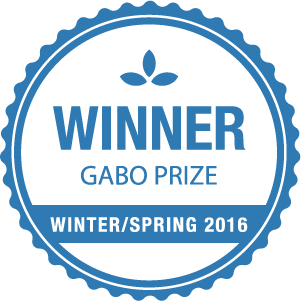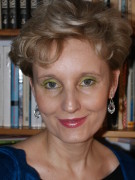Three Poems by Anna Piwkowska
Who recognized these crossroads, these poisonous bogs,
false lights of will-o’-the-wisps on succulent marshes?
Where are you today and what are you brewing
in your copper cauldrons—what new, sudden vision
of terrible fate led you to fulfill
a familiar prophecy, to spool the skeins of wool?
As usual, you are traveling. I am sitting in a flood
of transmissive lights, trying to read the verdicts.
Maybe it is better to pour olive oil on a wrathful fire
in the very heart of Athens, to throw Iphigenia’s shawl,
torn from her shoulders, onto the hissing essence
of sandalwood, onto its white flames.
Because the mornings were cold, because she shivered,
because she did not know whom to ask for advice.
So now what can I do, when I, descended
from her kind, suspect a similar betrayal?
Oh, all of us betrayed and sacrificed,
we commiserating nursemaids, Iphigenias,
towers of bone, Towers of Babel—
I believe in the unity of language,
soft whispers, alliance.
January 2005
Toward passage
Are these forgotten graves or buried animals?
How many years have they lain here, bleached, overgrown
with moss, deprived of breath, warmth, and happiness?
What destruction passed through this sweet ravine,
and on what misfortune did the fruit ripen?
The snap of a breaking branch and the eyes see
a small blot of dimmed magic in the pupil’s darkness.
Tired, scarred, grazed by love,
we depart through a meadow where once a man
might have killed a man, a hound an animal, and the darker-haired
sister drove her sharp knife into the fairer.
Is that dawn or dusk beyond the meadows, and what
are we walking on, where are we going, toward what annihilation?
But now the moon is rising and it lays its silver
across our bones, eyes, and sockets.
All drowns in this silver as in the sieve of time,
a dog howled, a red van shot by
as we emerged from the Dantean woods onto the road,
now prepared for further passage.
And with us our pots, dogs, foals, goats,
those small, lost, compromised,
an entire crowd of creatures, matted coats,
drowned pups, frightened eyes.
In a gray cap, by ferry, someone comes for us:
our Penates are packed, our Lares corrupt.
Nieborów, October 2009
Uncertain days
No one needs dreams any longer, winter is ending—
green bark on the trees, fragrant boxwoods,
new grass, and it’s probably almost time
for buttercups. A ray of sunlight
falls and wriggles down a red, faded roof.
These days are uncertain, and if we listen
by candlelight to Russian records,
to bows sawing silver cellos in the sky,
nostalgic melodies from southern seas,
or female voices, dense and operatic,
it is only for a moment,
and then we get in the car,
spattered with the greasy mud of March,
and drive impatiently down side roads,
watching the sky now clear, now dark, now a flash
that retreats like a mole to its subterranean bed.
Relentlessly we clean the attic, we buy seedlings
at the garden store, we begin to count
the days til spring and then the deep drifts come,
the dreams and snowstorms, a freezing draft from the windows.
Nieborów, March 2, 2007
![]()
Poranek Ifigenii
Kto poznał te rozstaje, trujące moczary,
błędne ogniki świateł na soczystych bagnach?
Gdzie przebywacie dzisiaj i jakie wywary
w waszych miedzianych garnkach, jaka nowa, nagła
wizja strasznego losu kazała wam spełnić
znajomą przepowiednię? motać kłębki wełny?
Ty jak zwykle w podróży. Ja w powodzi świateł
transmisyjnych, próbuję odczytać wyroki.
Może lepiej oliwę w samym sercu Aten
lać na gniewne ognisko, na syczące soki
drzewa sandałowego i białych płomieni
rzucić zerwaną z ramion chustkę Ifigenii?
Bo ranki były zimne, bo drżała od chłodu,
bo nie wiedziała, kogo ma prosić o radę.
Więc co mam robić teraz ja, która z jej rodu
wywiedziona, podobną podejrzewam zdradę?
Ach, my wszystkie zdradzone, złożone w ofierze,
współczujące piastunki, Ifigenie, wieże
z białej kości słoniowej, wieże Babel, wierzę
we wspólnotę języka, cichy szept, przymierze.
styczeń 2005
Ku przeprawie
To zapomniane groby czy pochówek zwierząt?
Ile lat mchem porosłe, wybielone leżą
pozbawione oddechu, ciepła, i radości?
Jaka zagłada przeszła przez ten słodki parów
i owoce na jakim nieszczęściu dojrzały?
Trzask łamanej gałązki i oczy dojrzały
w ciemnej źrenicy plamkę przygasłego czaru.
Zmęczeni, naznaczeni, draśnięci miłością
odchodzimy przez łąkę, gdzie kiedyś, być może,
człowiek zabił człowieka, chart zwierzę, a siostrę
jasnowłosą, ta czarna pchnęła ostrym nożem.
Czy to brzask nad łąkami, czy zmierzcha i po czym
stąpamy, gdzie idziemy, ku jakiej zagładzie?
Ale już księżyc wschodzi i srebrem się kładzie
na kości, oczodoły i na nasze oczy.
Wszystko tonie w tym srebrze jak w durszlaku czasu,
czerwona furgonetka przemknęła, pies zawył,
gdy wyszliśmy na szosę z dantejskiego lasu,
na dobre już gotowi do dalszej przeprawy.
A z nami nase garnki, psy, kozy, źrebięta,
te, które niedorosły, chore, utracone,
cała gromada zwierząt, futra skołtunione,
i oczy przerażone, topione szczenięta.
Ktoś w szarej cyklistówce płynie po nas promem:
penaty spakowane, lary przekupione.
Nieborów, październik 2009
Niepewne dni
Nikt już nie potrzebuje snów, dobiega końca
zima, pachną bukszpany, zielenieje kora
na drzewach, wschodzi trawa i zapewne wkrótce
pojawią się zawilce, spadnie promień słońca
i spełznie po czerwonej spłowiałej dachówce.
Dni są niepewne i jeśli słuchamy
w te dni, przy świecach, z płyt rosyjskich smyczków
tnących wysoko w niebie srebrne wiolonczele,
albo nut nostalgicznych znad mórz południowych,
albo głosów kobiecych, gęstych, operowych,
to tylko krótką chwilę, a potem wsiadamy
w samochód opryskany tłustym błotem marca,
by jechać niecierpliwie bocznymi drogami,
i patrzymy na niebo raz czyste, raz ciemne,
błysk, który jak kret wraca w koryta podziemne.
Wytrwale strych sprzątamy, w sklepach ogrodniczych
kupujemy sadzonki, zaczynamy liczyć
dni do wiosny i wtedy przychodzą głębokie
zaspy, sny i zamiecie, mróz ciągnie od okien.
Nieborów, 2 marca 2007
Translator’s Note
I recently had the pleasure of doing a reading together with Anna Piwkowska, where we took turns reading her poems, she in Polish, and I in English. It was a fascinating experience to hear them side by side—the way she intended them, and the way I’d interpreted them. She told me the translations did justice to her poems, and I asked her how she knew that, since she doesn’t know English. She said it was partly because she could hear it in the way I read them, the way I felt them, in the rhythm. In the introduction to our reading, Anna cited another great Polish poet, Wisława Szymborska, who had said that poems ought to be read—and heard—in their native language, where they retain their essence and convey the magic of the poetry. On one hand, I agree, but by no means do they need to be read only in their native language. Translation gives a poem new life, expanding its depth, stretching its frame. In translating these poems, I wanted to stand by their essence and magic, but I also wanted to allow the poems to live in a second language as gracefully as they had in the first.
I have loved Piwkowska’s poetry for a long time, partly because the things she writes about are the things that also fascinate me: myths, relationships, the natural order of the world. The way she weaves mythological tropes with nature and the everyday concepts of modern life is lovely, and she continues to assert that myth, while shadowy or mystical or ancient, is also universal. The images in Piwkowska’s poems are striking—blends of Polish countrysides and forests with Mediterranean landscapes with surreal images of stars and skies and the underworld. Her poems are highly visual while also being highly aural. Their rhythm is pervasive, and rhyme is always lurking in the corners. I don’t write poetry myself, but I have found translating poetry to be a unique experience, where paying attention to the meaning is one thing, but paying attention to the sound is quite another. It makes me notice, and it makes me explore the English language in a way that I usually don’t.
These three poems, in particular, while never intended to stand side by side, work wonderfully together. All three dwell on the cusp of things, on imminent change, on an uncertainty about what comes next. They dwell on the mundane and the mysterious both. It’s an honor to be able to translate them and to be published here.
Special Guest Judge, Tony Barnstone
“The best thing that translation can do is to extend the possibilities of writing in your home language. These translations of the Polish poet Anna Piwkowska bring over to English some absolutely gorgeous poems, but even more, they naturalize to English an aesthetic that is not native, and in the process they make English richer and make the possibilities for writing in English larger. How unexpected is the snap of a branch and the sudden vision of a small blot of dimmed magic in the pupil’s darkness in the violent woods. How gorgeous is the rising moon, laying its silver across our bones, eyes, and sockets. How surreal and emotional evocative are the bows sawing silver cellos in the sky. These are lovely poems, and they leave the reader with that hungry greediness that comes from eating something so delicious that you are left wanting more and more.”
– Dr. Tony Barnstone is a poet, translator, essayist, and the author of sixteen books, including Monster Verse: Poems Human and Inhuman (Everyman’s Library Pocket Poets, 2015), Beast in the Apartment (Sheep Meadow Press, 2014), and, most recently, Pulp Sonnets (Tupelo Press, 2015).
Anna Piwkowska is a poet and writer and the author of nine acclaimed books of poetry, including, most recently, Farbiarka (2009), which won the Warsaw Literary Prize, and Lustrzanka (2012). She is also the author of a novel based on the life of Austrian poet Georg Trakl, two books about the Russian poet Anna Akhmatova, and a young adult novel, Franciszka, which won the 2014 Polish IBBY Prize for best YA novel of the year. Her poems have been translated into English, German, Italian, Slovenian, French, Spanish, Catalan, and Slovak, and published in numerous anthologies. She lives in Warsaw.
Iza Wojciechowska received an MFA from Columbia University in 2012. She is the winner of PEN/Heim Translation award, and her translations of Anna Piwkowska’s poetry have appeared in A Public Space, Hayden’s Ferry Review, The Common, and The Massachusetts Review, which awarded her the Jules Chametzky Translation Prize. She works as a freelance writer and editor in Durham, NC.







